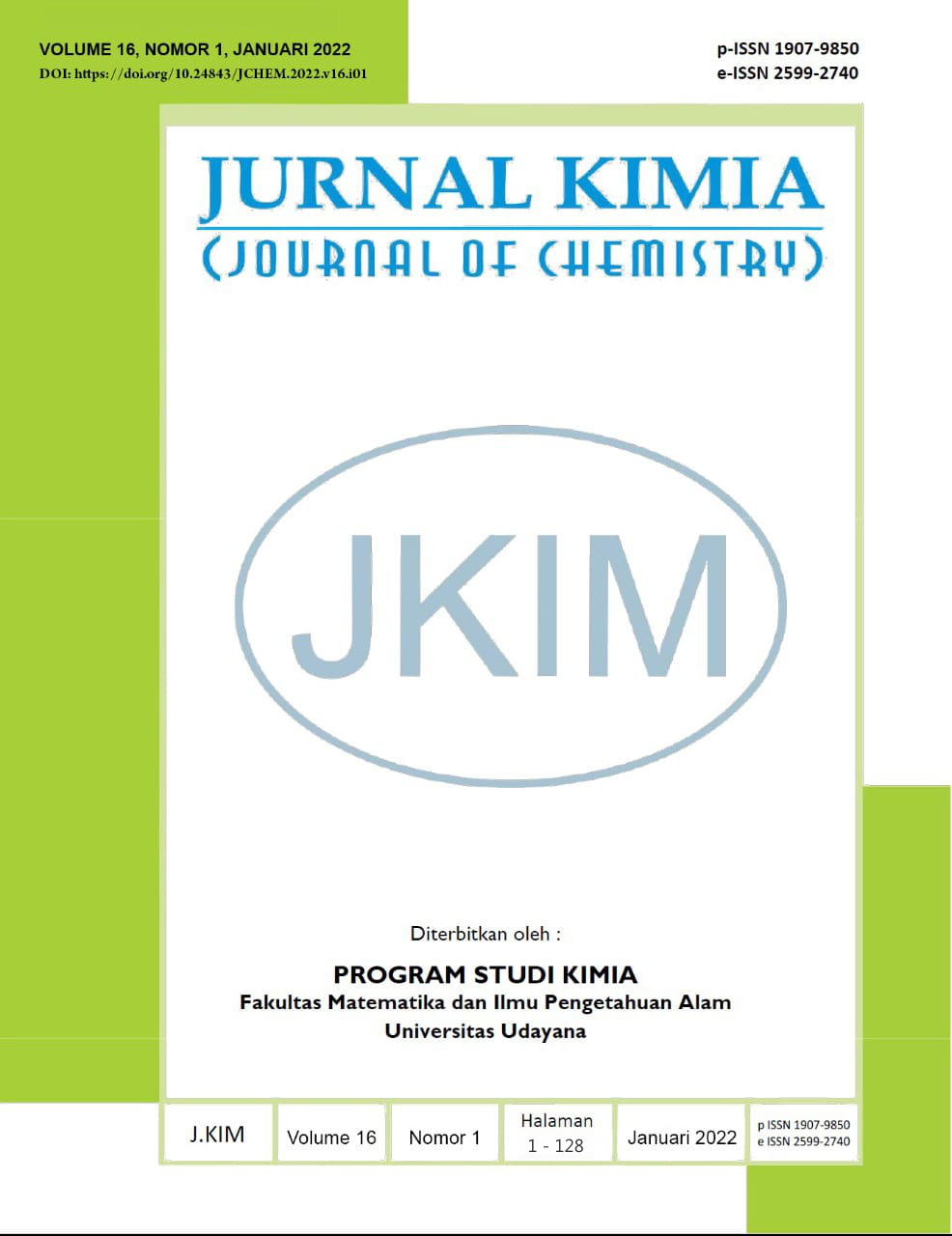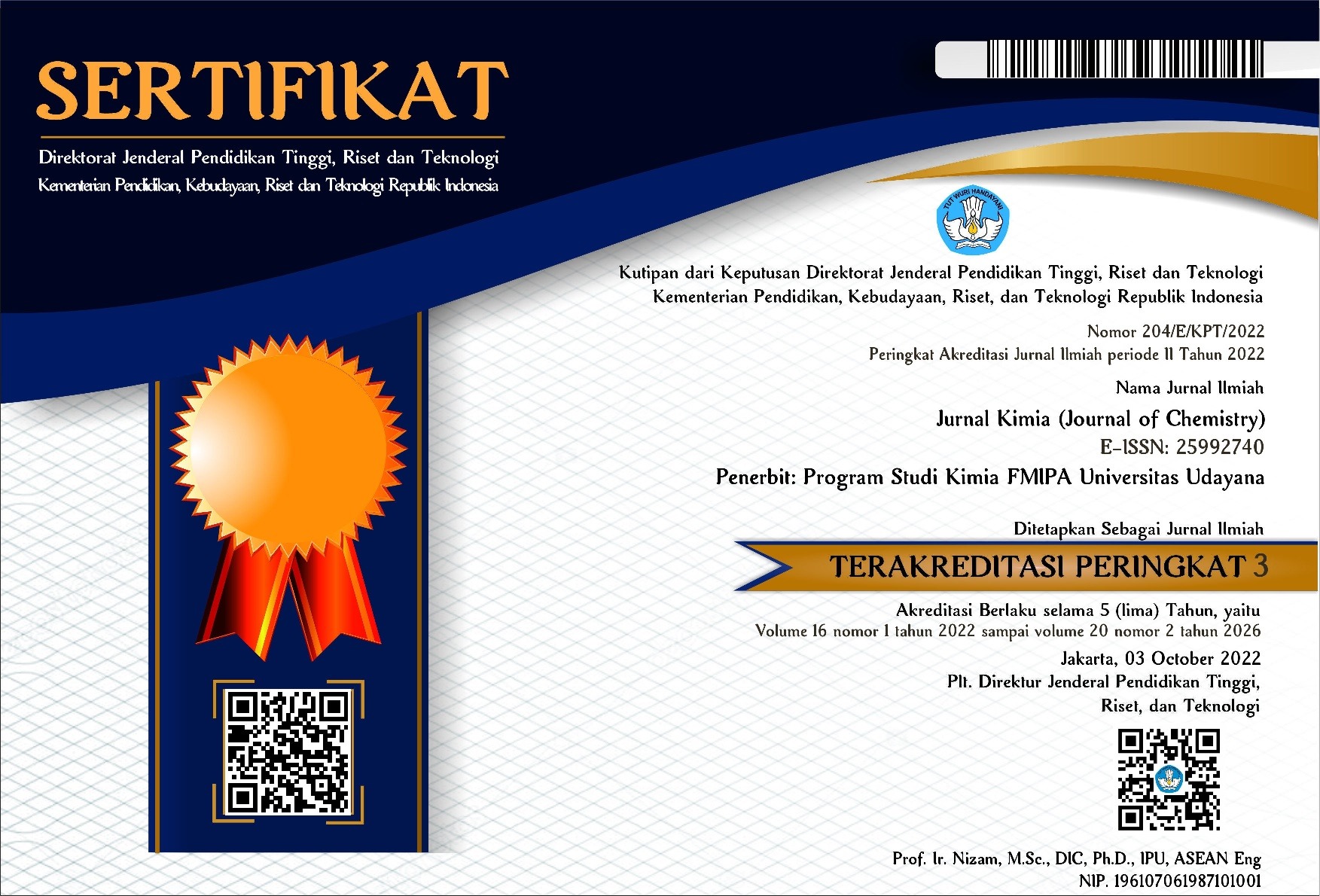KARAKTERISASI GREEN SYNTHESIS NANOPARTIKEL EMAS (NPAu) MENGGUNAKAN EKSTRAK AIR BIJI CENGKEH
Abstract
Metode baru untuk mensintesis nanopartikel emas yaitu metode green synthesis adalah metode yang sangat ramah lingkungan, murah, mudah dilakukan dan menggunakan pelarut yang aman bagi lingkungan. Aplikasi NPAu bagi kehidupan sangat luas seperti antioksidan, antibakteri, biosensor, antikanker dan lain-lain sehingga para ilmuwan berlomba untuk mencoba mensintesis NPAu. Penelitian ini bertujuan untuk mensintesis NPAu menggunakan prekursor HAuCl4 0,5 mM dan ekstrak air biji cengkeh 1%. Proses pembuatan NPAu ini dilakukan dengan mencampur larutan HAuCl4 dan ekstrak air biji cengkeh kemudian dipanaskan pada suhu 40?C dan 80?C. Karakterisasi NPAu dilakukan dengan beberapa metode yaitu spektrofotometer UV-Vis dimana didapat ?maks dari NPAu 540 nm (40?C) dan 542 nm (80?C), particle size analyzer menunjukkan ukuran partikel terkecil dari NPAu 116,8 nm dan hasil dari SEM EDS menunjukkan bentuk morfologi dari nanopartikel emas ini berupa kristal bulat dengan kandungan utamanya adalah emas murni.
Kata kunci: biji cengkeh, green synthesis, karakterisasi, nanopartikel emas.
A new method to synthesize gold nanoparticles, namely the green synthesis method, is a method that is environmentally friendly, inexpensive, easy to do and uses solvents that are safe for the environment. The application of AuNPs for life is very wide, such as antioxidants, antibacterials, biosensors, anticancer and others, so scientists are competing to try to synthesize AuNPs. This study aims to synthesize AuNPs using 0.5 mM HAuCl4 precursor and 1% water extract of clove seeds. The process of making AuNPs is carried out by mixing HAuCl4 solution and water extract of clove seeds then heating it at 40 ?C and 80 ?C. The characterization of AuNPs was carried out by several methods, namely UV-Vis spectrophotometer where the maximum wavelengths of AuNPs were 540 nm (40?C) and 542 nm (80?C), particle size analyzer showed that the smallest particle size of the AuNPs was 116.8 nm and the SEM EDS results showed that the morphological shape of the gold nanoparticles was in the form of sprerical crystals with the main content being pure gold.
Keywords: characterization, clove seeds, gold nanoparticles, green synthesis.
Downloads
References
Balalakshmi, C., Gopin, K., Govindarajan, M., Lokesh, R., Arumugam, A., Kadaikunna, S., Khaled, JM., Benelli, G. 2017. Green Synthesis of Gold Nanoparticles using a Cheap Sphaeranthus indicus Extract: Impact on Plant Cells and The Aquatic Crustacean Artemia nauplii. Journal of Photochemistry & Photobiology. B: Biology.
Basiuk, V.A., Basiuk E.V. 2015. Green Processes for Nanotechnology. Switzerland: Springer International Publishing.
Cui, Y., Zhao, Y., Tian, Y., Zhang, W., Lu, X., and Jiang, X. 2012. The Molecular Mechanism of Action of Bactericidal Gold Nanoparticles on Escherichia coli. Biomaterials. 33: 2327-2333.
Dehgani, F., Heshmatpour, A., Panjehshahin, M. R. and Khozani, T.T. 2012. Toxic Effects of Water/ Alcoholic Extract of Syzygum aromaticum on Sperm Quality, Sex Hormones and Reproductive Tissues in Male Mouse. IUFS J Biol. 71(2): 95-102.
Harborne JB. 1987. Metode Fitokimia. Bandung: Penerbit ITB.
Kumar, V. G., Gokavaparu, S. D., Rajeswari, A., Dhas, T. S., Karthick, V., Kapadia, Z., Shrestha, T., Barathy, I. A., Roy, A., Shinha, S. 2011. Facile Green Synthesis of Gold Nanoparticles using Leaf Extract of Antidiabetic Potent Cassia auriculata. Colloids and Surfaces B: Biointerfaces. 87: 159-163
Lestari, G. A. D, Suprihatin, I. E, Sibarani, J. 2019. Synthesis of Silver Nanoparticles (NPAg) using Andaliman (Zanthoxylum acanthopodium DC.) Fruit Water Extract and Its Application in Indigosol Blue Photodegradation. Journal of scientific & Applied Chemistry. 22: 200-205
Lestari, G. A. D, Suprihatin, I. E, Sibarani, J. 2020. Efektivitas Nanopartikel Perak (NPAg) untuk Fotodegradasi Zat Warna Indigosol Blue. Cakra Kimia. 8(1): 34-40.
Lestari, V.N.S. 2017. Pentingnya Motivasi Dalam Upaya Meningkatkan Produktivitas Karyawan
Luque, R., Varma, R.S. 2013. Sustainable Preparation of Metal Nanoparticles. The Royal Society of Chemistry.
Magudapatty, P., Gangopadhyayrans, P., Panigrahi, B.K., Nair, K.G.M., Dhara, S. 2001. Electrical transport studies of Ag nanoclusters embedded in glass matrix. Phys. B. 299: 142–146.
Manjari, G., Saran, S., Arun, T., Suja, P., Devipriya, A., Rao, V. B. 2017. Facile Aglaia elaeagnoidea Mediated Synthesis of Silver and Gold Nanoparticles: Antioxidant and Catalysis. J Clust Sci. doi: 10.1007/s10876-017-1199-8.
Philip, D. 2010. Rapid Green Synthesis of Spherical Gold Nanoparticles using Mangifera indicaLeaf. Spectrochimica Acta Part A. 77: 807-810
Rahma, D. E. 2019. Sintesis Nanopartikel Emas Menggunakan Bioreduktor Ekstrak Daun Ketapang (Terminalia catapa) dengan Irradiasi Microwave. Skripsi.
Razafimamonjison G, Jahiel M, Duclos T, Ramanoelina P, Fawbush, Danthu P. 2014. Bud, Leaf and Stem Essential Oil Composition of Syzygium aromaticum from Madagascar, Indonesia and Zanzibar. International Journal of Basic and Applied Sciences. 3(3): 224-233.
Saha, K., Agasti, S. S., Kim, C., Li, X., Rotello, V. 2012. Gold Nanoparticles in Chemical and Biological Sensing. M. Chem. Rev
Veena, T.D. 2019. Green Synthesis of Gold Nanoparticles from Vitex negundo Leaf Extract: Characterization and In Vitro Evaluation of Antioxidant-Antibacterial Activity. Journal of Cluster Science.
Verma, H.N., Singh, P., and Chavan, R.M. 2014. Gold Nanoparticle: Synthesis and Characterization. Veterinary World, 7.
Yuan, Y., Gao, Y.X., Zhao, J., Mao, L. 2008. Characterization and stability evaluation of β-carotene nanoemulsions prepared by high pressure homogenization under various emulsifying conditions. Food Research International. 41: 61-68.

This work is licensed under a Creative Commons Attribution 4.0 International License






